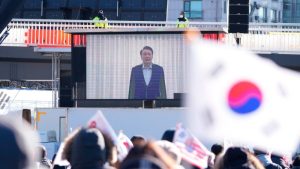© Reuters. A hand is seen on a laptop with binary codes displayed in front of the USA flag in this illustration taken, August 19, 2022. REUTERS/Dado Ruvic/Illustration/File photo
By Jonathan Stempel
(Reuters) – A federal judge on Monday blocked California from enforcing a law meant to protect children when they use the internet, saying the law’s commercial speech restrictions likely violate the U.S. Constitution’s First Amendment.
In granting a preliminary injunction, U.S. District Judge Beth Labson Freeman in San Jose, California, said she was “keenly aware of the myriad harms that may befall children on the internet,” but California’s law swept too broadly.
The law, known as California Age-Appropriate Design Code Act, was passed unanimously last September by the state legislature and signed by Governor Gavin Newsom. It requires platforms, before releasing any online products and services, to assess whether their offerings could harm children.
Businesses must also estimate the ages of child users and configure privacy settings for them, or else provide high settings for everyone.
The law, modeled after a similar law in the United Kingdom, is scheduled to take effect next July 1.
NetChoice, a trade group whose members include Amazon.com (NASDAQ:), Alphabet (NASDAQ:)’s Google, Facebook parent Meta Platforms (NASDAQ:) and ByteDance’s TikTok, sued last December to block the law.
NetChoice said the law would pressure private companies into becoming “roving censors” of content that California deems harmful, or else face “draconian penalties” as high as $7,500 per child per violation.
In a 45-page decision, Freeman noted California’s argument that businesses “have complete discretion to set whatever policies they wish. But she said that commitment “flies in the face of a platform’s First Amendment right to choose in any given instance to permit one post but prohibit a substantially similar one.”
Freeman also said California’s threatened enforcement constituted irreparable harm to NetChoice members, and could end up shielding adults as well, reducing them to “reading only what is fit for children.”
The office of California Attorney General Rob Bonta, which enforces California’s laws, said: “We are disappointed by the decision and will respond in court as appropriate.”
NetChoice welcomed the decision. “We look forward to seeing the law permanently struck down and online speech and privacy fully protected,” it said.
Other courts have also curbed limits on how children spend time online.
Last month, for example, U.S. District Judge David Ezra in Austin, Texas, blocked that state from requiring adult content websites to verify ages and warn users about the purported harmful effects of pornography.
Texas filed a notice of appeal the same day. Its law had been challenged by the Free Speech Coalition, a trade group for the adult entertainment industry.
The California case is NetChoice LLC v Bonta, U.S. District Court, Northern District of California, No. 22-08861.
Read the full article here












